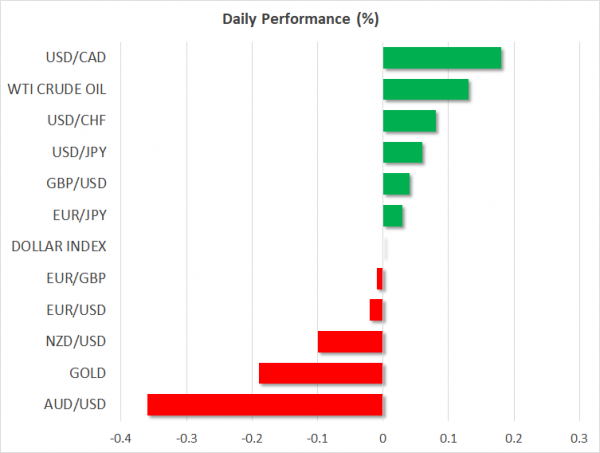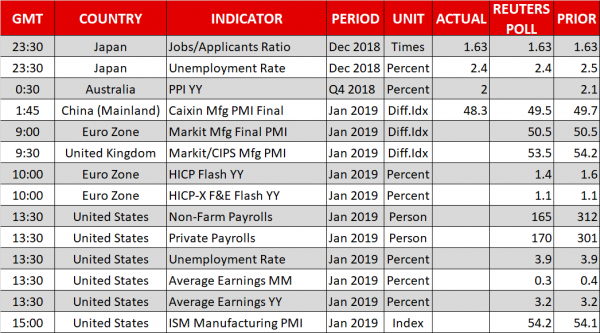- The US employment report takes center stage today; dollar may be at risk
- Euro turns lower as Italy enters recession, Weidmann strikes dovish tone
- US stocks advance amid “progress” in trade talks
Dollar rebounds, turns its sights to US employment data
The dollar shaked off some of its post-FOMC weakness against a basket of six major currencies, mainly because the euro retreated (see below). There was little in terms of US catalysts, but that changes today, as the all-important jobs report for January will hit the markets. Nonfarm payrolls are forecast to have risen by 165k, less than the extraordinary 312k in December, but still a solid number overall. The unemployment rate is expected to have held steady at 3.9%, while wages are anticipated to have risen at the same pace as previously, by 3.2% in yearly terms.
This was the month the government was partially shut, so there may be some “noise” in these data. For instance, it wouldn’t be surprising to see an uptick in the unemployment rate, as those workers were reportedly counted as temporarily unemployed. In any case, attention will likely fall mainly on wages, as the FOMC made it clear that a material pickup in price pressures is required for further hikes. Traders, meanwhile, view the next move by the Fed as most likely to be a rate cut, with money markets pointing to a 20% probability for such an action by December. As for the dollar, risks seem asymmetrically tilted to the downside, as any weakness in this report would serve to augment rate-cut expectations, whereas it’s doubtful that even a strong positive surprise would be enough to turn this dovish sentiment around.
The ISM manufacturing PMI for January is also due out.
Italy enters recession as ECB hawks turn cautious, euro reels
Italy’s economy shrank for a second consecutive quarter at the close of 2018, marking a technical recession for the Eurozone’s third largest economy. This was, at least partially, the outcome of tanking business confidence amid the government’s standoff with the EU over budget rules. The news took the winds out of the euro’s sails, causing the single currency – which until that moment was enjoying gains against the bleeding dollar – to reverse course and close the day lower.
Some cautious remarks by the influential President of the German central bank, Jens Weidmann, contributed too. Breaking from his traditionally-confident tone, he highlighted that growth in the bloc’s powerhouse will be notably weaker than potential, and appeared in no hurry to normalize policy. When hawks like Weidmann start to backpedal on their usual rhetoric, it’s a strong sign that other ‘centrist’ policymakers are probably more worried than they are letting on. Today, we’ll get the bloc’s flash inflation data for January, and in light of these concerns, any surprises will dictate the euro’s path.
Signs of tentative progress in trade talks lift stocks
American and Chinese negotiators heralded substantial progress in the trade negotiations that concluded yesterday, though without providing too many details on what remains to be settled. Trump noted that President Xi and himself would meet soon to iron out the “more difficult points”. Secretary Mnuchin and chief negotiator Lighthizer said they’ll travel to China soon to hold another round of talks. Markets interpreted these as signals that the process is moving forward and that both sides remain keen to strike a deal, with the likes of the S&P 500 (+0.88%) posting decent gains.
Other highlights: UK manufacturing PMI, earnings, and Fed-speak
Besides the US employment report and Eurozone’s latest inflation figures, the other highlight on the calendar today will be the UK manufacturing PMI for January.
In equities, notable names releasing their earnings results include energy giants Exxon Mobil and Chevron.
There’s only one speaker on the agenda: Dallas Fed President Robert Kaplan (14:45 GMT).


